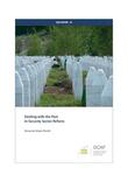Explore

Dealing with the Past in Security Sector Reform
0 Ungluers have
Faved this Work
Login to Fave
Security sector reform (SSR) and transitional justice processes often occur alongside each other in societies emerging from conflict or authoritarian rule, involve many of the same actors, are supported by some of the same partner countries and impact on each other. Yet the relationship between SSR and transitional justice, or 'dealing with the past' (DwP) as it is also called, remains underexplored and is often marked by ignorance and resistance. While SSR and transitional justice processes can get into each other's way, this paper argues that SSR and DwP are intrinsically linked and can complement each other. SSR can make for better transitional justice and vice versa. Transitional justice needs SSR to prevent a recurrence of abuses, an essential element of justice. SSR can learn from transitional justice not only that it is better to deal with rather than ignore an abusive past but also how to address an abusive legacy in the security sector. The validity of these assumptions is tested in two case studies: the police reform process in Bosnia and Herzegovina after 1995 and the SSR process in Nepal after 2006.
This book is included in DOAB.
Why read this book? Have your say.
You must be logged in to comment.
Rights Information
Are you the author or publisher of this work? If so, you can claim it as yours by registering as an Unglue.it rights holder.Downloads
This work has been downloaded 651 times via unglue.it ebook links.
- 16 - pdf (None) at Google Books.
- 95 - pdf (CC BY) at Unglue.it.
Keywords
- Good governance
- Human rights
- Politics & government
- post-conflict
- Security sector reform
- Society & Social Sciences
- thema EDItEUR::J Society and Social Sciences::JP Politics and government
- thema EDItEUR::J Society and Social Sciences::JW Warfare and defence
- transition
- Transitional justice
- Warfare & Defence
Links
DOI: 10.5334/bbuweb: http://www.ubiquitypress.com/site/books/10.5334/bbu/
Editions

